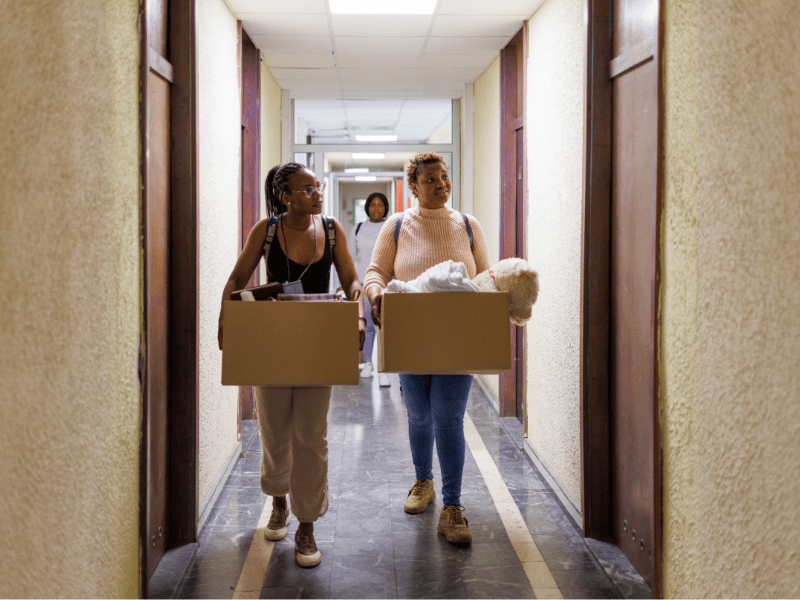
Every college student should have a personal fire safety plan when heading back to school for a new semester. Most schools have their own fire safety measures and provisions, but you can take even more actions to prevent fires in your dorm room, residence hall, and on campus. Here are nine back-to-school safety tips to utilize all semester long.
1. Know How to Use Hot Plates and Microwaves Safely
If the residence halls on your campus are LEED-certified, they might feature built-in protections and reinforcements against the most common causes of dorm fires. But even so, a thorough fire safety plan should account for knowing how to safely operate microwaves, hot plates, and other cooking appliances. Never turn your back on these units while they’re in use, and make sure to unplug them once you’re done cooking.
2. Do Not Overload Power Strips and Extension Cords
Pay attention to how you use power strips, surge protectors, and extension cords in your dorm room. Because surge protectors offer limited protection, it’s crucial to replace them before each semester. Don’t plug more than one device into a power strip at one time, and keep in mind: extension cords are meant for temporary use in a pinch—they’re not a permanent solution. If you need power for more than a few hours, don’t use an extension cord.
3. Understand the Fire Safety Plan for Your Residence Hall
Just about every school offers an orientation with back-to-school safety tips. These orientations also discuss evacuation routes and outline what to expect with residence hall fire drills. Take this training seriously and listen to all the information carefully. What you learn could save a life and minimize panic if a fire occurs in your residence hall.
4. Be Careful Not to Obstruct or Tamper with Fire Sprinklers
Do not hang decorations from fire sprinklers, paint over them, placing tall furniture underneath sprinkler heads, or do anything that could obstruct their ability to function. These common fire sprinkler mistakes can limit the range of water dispersal or cause damage that will prevent these mechanisms from activating in critical moments.
5. Know Where to Locate Fire Suppression Equipment
According to FEMA estimates, 3,800 residence hall fires occur each year. You can take an active role in protecting your dorm by knowing the location of fire extinguishers. Many schools offer courses that teach students how to use this equipment as well. That knowledge can be invaluable in the event of a possible residence hall fire.
6. Stand Firm in Your Resolve—Don’t Cave to Peer Pressure
If your roommates are not as serious about creating a fire safety plan, don’t let this throw you off-course. If they violate some of these back-to-school safety tips, remind them why it matters to remain vigilant. Even if you feel like a nuisance at the time, chances are, they’ll be grateful for your persistence when it circles back to help them avoid a close call.
7. Maintain a Clear, Uncluttered Pathway to the Exit Door
Dorm rooms are notoriously cramped—an issue that only tends to worsen as you accumulate more items throughout the semester. But even if the clutter does increase, make a conscious effort to keep access to the doorway free and clear. Ensure everyone in the dorm room can reach the exit without any obstructions blocking their path.
8. Avoid the Use of Flammable Items or Materials in Your Dorm
Most college and university residence halls prohibit smoking, but even if yours is the exception, be careful to ensure that no one smokes in your dorm—or even in the common areas. You’ll also want to avoid the use of candles, incense, or other flammable items inside. It only takes one time to overlook a burning candle or incense. Failure to snuff it out or accidentally knocking it over could engulf your room in flames within a matter of seconds.
9. If You See Something, Say Something—Your Voice Matters
Every residence hall has monitors to catch rule violations and potential safety issues. So, if you notice frayed wires, lights flickers, or other fire hazards, alert your residence hall monitor right away. Then, follow-up on the status of your report to be sure it’s taken seriously.
Start Your Semester with these Back-to-School Safety Tips
If your school partners with our team here at A&A Fire Protection, they’ll receive the best fire sprinkler testing and maintenance services in the industry. Not sure which fire protection service your campus works with? Contact the school’s environmental, health, and safety department and put them in touch with us to discuss the fire sprinkler services we offer.



